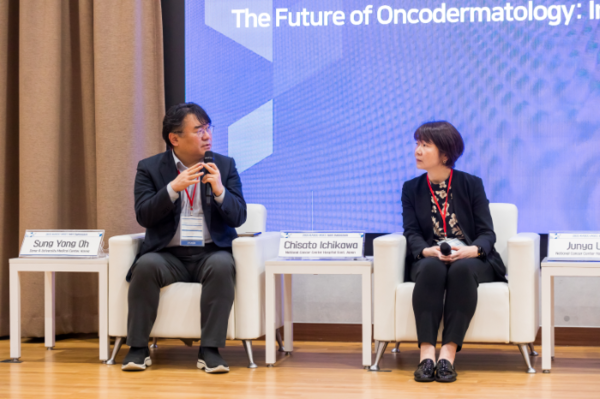Experts recently emphasized the need to institutionalize early palliative care and establish a continuous care system through hospital-community linkages to improve the quality of life of cancer patients in Korea.
They discussed these issues at the Korean Academy of Supportive Care in Cancer (KASCC) conference on March 22 at Yonsei University.
The conference featured sessions on healthcare data research, policy discussions on cancer patient care through hospital-family-society cooperation, and a joint session on managing skin toxicity from antineoplastic drugs.
In the joint session, palliative care experts from Korea and Japan shared their latest knowledge on clinical research and nursing management of anticancer drug-related dermatotoxicity.

Professor Oh Sung-yong (left) of the Department of Hematology-Oncology at Dong-A University Hospital and Chisato Ichikawa, the oncology clinical specialist and head nurse at National Cancer Center Hospital East, speak at the KASCC session on March 22 in Seoul. (Credit: KSMO)
Professor Oh Sung-yong of the Department of Hematology-Oncology at Dong-A University Hospital led the KASCC session. Based on his experience developing EGF cream to treat skin side effects of EGFR inhibitors, he emphasized the importance of standard treatment guidelines, the development of assessment tools, pharmaceutical company cooperation, basic research, and multidisciplinary approaches.
The Japanese Academy of Supportive Care in Cancer (JASCC) was represented by Chisato Ichikawa, the oncology clinical specialist and head nurse at National Cancer Center Hospital East, who presented on how to manage skin toxicities that occur during antineoplastic therapy in collaboration with a multidisciplinary team and how to support safe and effective treatment through patient education and strengthening the role of nurses.
In the policy discussion session, experts from various fields, including Professor Kang Jung-hun of the Department of Hematology-Oncology at Gyeongsang National University Hospital, Professor Lee Han-sang, director of the Palliative Care Center at Chungnam Regional Cancer Center of Dankook University Hospital, Professor Baek Sun-kyung of the Department of Oncology-Hematology at Kyung Hee University Medical Center, Ahn Ki-jong, president of the Korea Alliance of Patient Organization, and Cho Dong-chan, an academic director of the Korea Science Journalists Association, discussed the realities and institutional challenges of the cancer patient care system.
The KASCC underscored the urgency of system improvements, noting that cancer—Korea’s leading cause of death—is still not designated as an essential medical treatment.
Experts also highlighted the challenges of providing continuous care for patients transitioning between hospitals and homes in an aging society and stressed the need to prioritize early palliative care over curative approaches.
Professors Lee and Baek cited research findings showing that early palliative care interventions positively impact the quality of life and treatment outcomes of cancer patients and emphasized the urgent need to establish systems and standards to support them.
The patient group’s Ahn described the burden on patients and their caregivers, pointing out that lack of infrastructure and inadequate systems hinder the continuity of cancer care.
Cho, who represented journalists, added that aging and dying should be viewed as a cultural and social issue, not just a medical issue, and that more policy attention and social discussion are needed.
At the general meeting held after the congress, Professor Jeung Hei-cheul of the Department of Medical Oncology at Gangnam Severance Hospital was elected as the new KASCC president.
"We will maintain a systematic approach to advocating for early palliative care institutionalization and policy improvements to ensure lifelong cancer patient care," Professor Jeung said.
The KASCC was established in 2021 as an institution under the Korean Society of Medical Oncology (KSMO) to contribute to the lives of cancer patients through education, academic research, and health policy development in palliative care for cancer patients and related medical personnel.